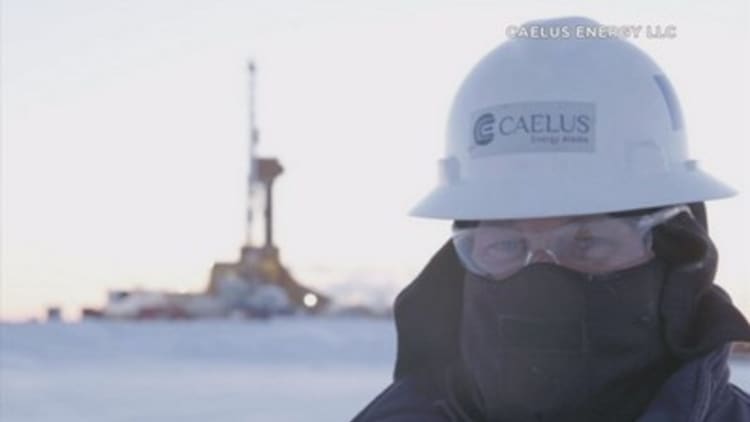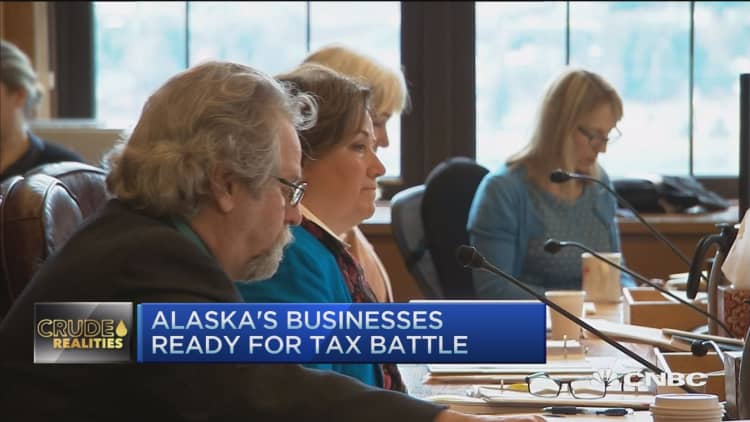
A huge oil discovery in Alaska has put into stark relief the state's battle over the government role in promoting fossil fuel exploration and financially supporting the energy industry.
Caelus Energy announced last week it made one of the largest U.S. oil finds in recent history on Alaska's North Slope — a behemoth in the shallow waters of Smith Bay from which the independent driller believes it can extract 1.8 billion to 2.4 billion barrels of crude.
Production on that scale could help turn the tide for an energy-dependent state whose oil output has been in decline for three decades and which faces forecasts that crude prices will not soon breach the $100-per-barrel levels that once filled government coffers.
But the two-year oil price downturn has stoked challenges to the Alaska tax incentives that were implemented to attract fossil fuel explorers like Caelus Energy in the first place.
Facing a multibillion budget deficit, Alaska has begun paring back those incentives, and further reform is on the table. At the same time, Democratic presidential front-runner Hillary Clinton says she will seek to eliminate $60 billion in federal tax benefits and loopholes for the energy industry, while simultaneously pushing policies aimed at reducing U.S. oil consumption.
Striking a balance between fiscal stability and encouraging future drilling is critical for Alaska, because the state has generated as much as 90 percent of its revenue from oil and gas operations in the past. The industry also feeds the Alaska Permanent Fund, which pays out an annual dividend to every man, woman and child in Alaska.
Caelus Energy, formed in 2011 and backed by private equity firm Apollo Global Management, has advocated keeping the existing tax structure in place. In a release announcing the Smith Bay find, Caelus CEO Jim Musselman said: "Fiscal stability going forward is critical for a project of this magnitude. Without the state tax credit programs, none of this would've happened, and I'm not sure Caelus would've come to explore in Alaska."
Musselman acknowledged the state is weathering tough times, but he expressed optimism the industry and legislators will forge a path forward.
"This is such a large project. I think we'll all roll our sleeves up and figure out a way to make this work," Musselman told CNBC. "Frankly, I can't tell you how that's going to happen, but it's too important for the state not to work."
As a sign of Smith Bay's benefit to the state, he said production from the area could add 200,000 barrels per day of light crude to the Trans-Alaska Pipeline. The pipeline, which delivers North Slope crude to the southern shores of Valdez, now carries only about one quarter of its full capacity, making it less efficient and more costly to operate.
Alaska lawmakers voted to reduce tax subsidies in June, but the deepest cuts affected producers outside the North Slope, the vast expanse of northern Alaska that is home to Prudhoe Bay, one of America's largest oil fields. Another round of reform proposed by Gov. Bill Walker would take more direct aim at North Slope drillers.
Walker has proposed increasing the minimum gross tax on oil production from 4 percent to 5 percent when crude prices rise above $55 a barrel, the Alaska Dispatch News reported. He has also floated ending the practice of giving state-funded tax credits and rebates to North Slope drillers that operate at a loss or lose money while bringing on new production.
The credits are intended to encourage exploration and spur development. The idea is they will pay off when drillers strike oil and bring new production to market, creating jobs and tax revenue. But to some, the credits now look unsustainable as Alaska sinks into the red.
Independent drillers see rebates as a critical pillar of support during the exploration process, when they are plowing money into uncertain prospects with no immediate return on investment. Like the wildcatters who drove America's shale oil and gas boom, these independents are taking on the risk of exploration as big integrated oil companies like BP and Exxon Mobil reduce investment in the Last Frontier.
If the state is to continue supporting the industry, the governor would like to make sure more of the financial rewards reaped by oil companies from tax benefits will stay in Alaska, said John Hendrix, an energy advisor to Walker and former oil engineer at BP and general manager of Apache's Alaska operations.
"We're trying to get the right fit, and it's delicate up here coming off those highs to these lows. We want to continue to encourage Alaska investors and exploration and production," he told CNBC.
Alaska has paid out about $8 billion in tax credits to energy companies through the end of fiscal 2016. The state has footed up to 55 to 65 percent of project development costs, and up to 85 percent of exploration expenses.
Hendrix said that once rebates are paid to Caleus Energy, the state will have plowed more money into the Smith Bay project than the company itself.
"At what stage do we say, 'You're a company. You're on your own. Go for it?'" he asked.
Musselman said Caelus has spent about $138 million on the Smith Bay project, and was owed roughly $100 million in credits from the state. About $51 million of the state aid was through a program intended to spur development in areas far removed from existing infrastructure. Caelus will use part of that rebate to offset the cost of having ice roads built to bring 240 truckloads to the site, he added.
"The way we look at it is the state of Alaska is investing in their future and this has been a really good investment. They'll get 20, 30 times their money back over time," Musselman said. "That's what gets lost in a lot of the politics up there."
In the view of Kara Moriarty, president of the Alaska Oil and Gas Association, the Smith Bay discovery shows that Alaska's 2013 oil tax reform — which included more favorable industry tax credits — has achieved what policymakers set out to achieve: attracting new, smaller companies to invest in oil and gas development.
"Obviously it's very exciting news, but I think it underscores the fact that Alaska needs to provide some type of incentive" to explore for oil and gas, Moriarty said, citing the higher production costs of operating in Alaska versus the Lower 48.
The incentives already cut have made the Smith Bay project economics more challenging, and they could be made even more difficult, she said, noting the discovery is located a considerable distance from existing transportation infrastructure and the Trans-Alaska Pipeline.

As elections near, some political operatives have seized on the oil and gas issue, aiming to blame Alaska's deficit on the current tax structure, rather than a historic collapse in crude prices, Moriarty said.
"It's not the policy per se. It's price that has driven the deficit," she said.
But that thinking cuts the other way, too, according to Doug Reynolds, an economics professor at the University of Alaska Fairbanks. While tax credits promote exploration and development, rising oil prices between 2008 and 2014 boosted spending on new projects.
The Smith Bay strike is so large, Reynolds said he cannot imagine it would not be developed under a less accommodating tax structure. He also rejects the notion that Alaska production, absent subsidies, isn't competitive with areas like North Dakota's Bakken formation and Texas's Eagle Ford basin.
"What often happens is you get saturation in Eagle Ford and Bakken fields, and only so many people can work there at a time. If there's money to be made, more than in any other industry, the market, the Wall Street money will go into new companies that are willing to go into Alaska even if it is a little bit more expensive," he said.
Hendrix, the energy advisor to Walker, said he believes Alaska can offer incentives beyond tax benefits, such as building roads to oilfields, expediting permitting for drilling and making land accessible. Musselman, as well, said he believes state and industry can find common ground in public-private infrastructure projects.
Ultimately though, the current budget crisis will likely require some tough decisions on tax reform, Hendrix said.
"Like it or not, we're an oil state," he said. "It's the only lever we can really pull."


